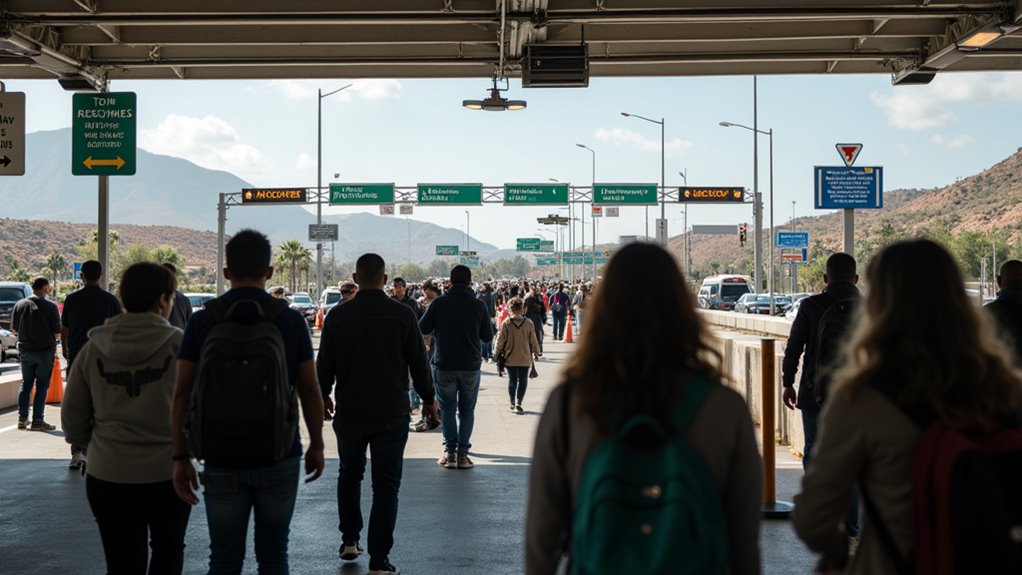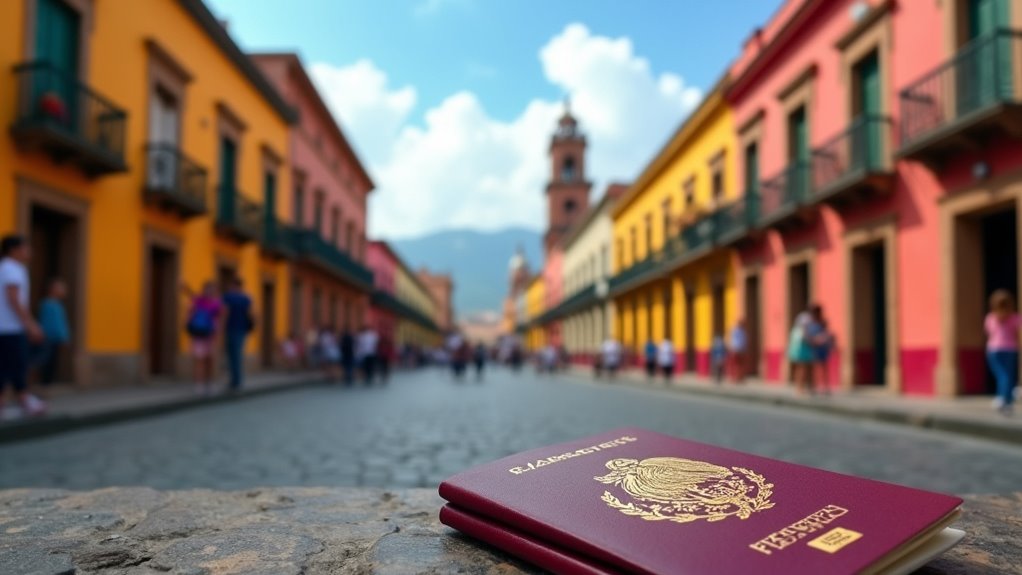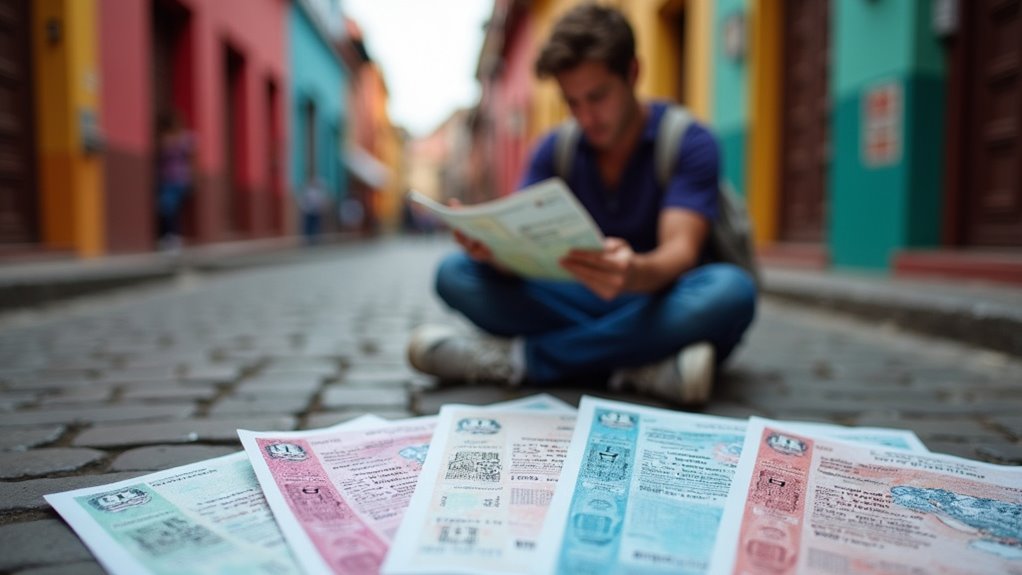Physical Address
304 North Cardinal St.
Dorchester Center, MA 02124
Physical Address
304 North Cardinal St.
Dorchester Center, MA 02124

Wondering about the different visa options for extended stays in Mexico? Discover the key details to maximize your time in this vibrant country.
Visiting Mexico? You can stay visa-free for up to 180 days – but did you know that’s just the tip of the iceberg? From tourist visas to permanent residence, Mexico offers a variety of options to extend your stay. Whether you’re looking to work, study, or simply enjoy the country’s vibrant culture, understanding the different visa types and their requirements is key to making the most of your time in Mexico.

What’re the general visitor visa requirements for entering Mexico?
You’ll need a valid passport with at least 6 months of validity and one blank page, a passport photocopy, a passport-sized photo, a completed application form, and $54 USD in cash. Visa fees are $54 USD for any type of visa. For a temporary resident visa, you’ll need proof of legal status in your current country, financial proof of at least 300 days of minimum wage equivalent, and a letter of intent. Permanent resident visas require proof of financial sustainability, family ties documentation, and a two-year temporary residency prerequisite. Minors will need additional documents like birth certificates and parental authorization. Understand the specific visa types and their requirements to determine the best option for your stay in Mexico.
Visitors from many countries can enjoy a visa-free stay in Mexico for up to 180 days, though the actual length of your permitted stay is ultimately at the discretion of the immigration officials at the port of entry. The number of days granted is now at the discretion of the immigration official, based on the visitor’s intentions communicated during entry. You’ll need to complete a Multiple Migratory Form (FMM) upon arrival, which will specify the duration of your stay. Extensions or renewals aren’t allowed, so you must depart Mexico before your permit expires. For longer stays, applying for residency is recommended. Contact your local National Institute of Migration (INM) office if you have any questions about the rules and procedures for your visit.

Though there’s no minimum passport validity period required for entry into Mexico, you should check airline-specific rules, as some carriers may enforce a 6-month validity.
While Mexico has no specific passport validity requirement, airlines may demand at least 6 months of remaining validity.
Expired U.S. visas or resident cards necessitate a Mexican visa application. Permanent residents of the U.S., Canada, Schengen Area, and other designated countries are exempt from visas.
For entry, you’ll need a valid passport or travel document, and you may still be required to complete the FMMd (Digital Migration Form), though this is waived in many cities by 2025. You must keep the FMMd until your departure.
Supporting documents vary by purpose, such as tourism, business, or student status.
Charting the various visa options is essential for a seamless experience in Mexico.
Tourist visas allow you to visit for up to 180 days for leisure, business, or cultural activities, with a possible 10-year multiple-entry option.
Transit visas facilitate short-term passage through Mexico to another destination, typically limited to airport layovers or 30 days for land travel.
Temporary resident visas span 180 days to 4 years, covering work, study, family, and investment purposes, requiring separate employment authorization.
Permanent resident visas grant indefinite stay and full work rights, accessible through retirement, family ties, or extended temporary residency.
Adoption visas enable legal adoption processes involving Mexican nationals, valid for up to 6 months.

Your permitted stay in Mexico can vary depending on the type of visa you obtain.
With a tourist visa (FMM Visitor Permit), you can stay up to 180 days, though the exact duration is at the discretion of immigration officials. Foreign nationals are exempt from a visa for non-lucrative visits to Mexico for up to 180 days. Temporary residency visas are valid for 1-4 years and are renewable. To qualify, you’ll need to demonstrate sufficient income or savings.
After 4 years, you may be eligible for permanent residency, which allows unlimited stay. Other specialized visas, such as work, student, or investor visas, have durations matching their purpose.
Regardless of your visa, it’s essential to exit Mexico before it expires to avoid fines, deportation, or entry bans.
Applying for visas in Mexico typically involves several essential steps.
First, contact the Mexican embassy or consulate to schedule an appointment for your visa application.
Then, download and complete the Mexico Visa Application Form, and gather all required documents, including a valid passport and passport photos. Mexico Visa Overview
Attend your scheduled appointment, submit your application and documents, and pay the necessary fees.
The embassy will verify your documents and process your application, which may take several days or weeks.
Once approved, you’ll receive your visa and can travel to Mexico within the validity period.
Remember to comply with the visa terms and register with local authorities if required.

Entering Mexico requires specific travel documents, depending on your nationality and purpose of visit. If you’re a permanent resident of countries like the U.S., Canada, or Europe, you don’t need a Mexican visa but must show your residence card. The 12 News YouTube channel focuses on news-related content. Otherwise, you’ll need a valid visa or be exempt based on your nationality. Regardless, your passport must be valid throughout your stay, and airlines often enforce a six-month validity rule. Plus, you can’t bring more than $10,000 in cash. For extended stays exceeding 180 days, you’ll need a visa specific to your purpose, such as work or study. Some nationalities have also faced entry difficulties or restrictions, so check the latest requirements.
Beyond temporary visits, Mexico offers several residency options for those seeking a longer-term stay.
You can apply for:
[As a resident, you’ll enjoy benefits like healthcare access, tax obligations, banking services, and more flexibility to integrate into local communities and culture.] Proof of financial solvency is a key requirement for many of these residency options.
Whether you’re dreaming of a sun-soaked getaway or an extended stay in Mexico, there’s a visa option that’ll fit your needs like a glove. From the breezy 180-day visa-free stint to the permanent resident’s all-access pass, Mexico’s got you covered. So don’t let the bureaucracy bog you down – learn about the fiesta and let the good times roll!